"Music is a friend of labor for it lightens the task by
refreshing the nerves and spirit of the worker."
AUTHOR: William Green
MEANING OF THE QUOTE:
"The rhythmic beats of music not only
help people pace their daily work activities
but also make the work more enjoyable."
ELIJAH OPUS 70
(ORATORIO)
(A sacred drama in the same format
as an opera, performed in a concert
setting without staging or costumes.)
 |
| Prophet Elijah, from The State Hermitage Museum |
ELIJAH OPUS 70
Complete
Ann Howard Jones, Conductor
Boston University Symphony Orchestra
and Symphonic Chorus, 2011
ARTICLE FROM:
Irving S. Gilmore Music Library
http://www.library.yale.edu/musiclib/exhibits/mendelssohn/elijah1.htm
Irving S. Gilmore Music Library
http://www.library.yale.edu/musiclib/exhibits/mendelssohn/elijah1.htm
Mendelssohn’s first oratorio, St. Paul (1836),
 |
| http://www.library.yale.edu/musiclib/exhibits/mendelssohn/oratorio.htm |
achieved such an extraordinary success that it
was a difficult act to follow. Mendelssohn
immediately began contemplating the possibility
of a second oratorio, and he even considered
setting the story of Elijah. But for nearly a
decade, these plans remained unfulfilled. He
was apparently thinking about Elijah again in
1845, and when the Birmingham Music Festival
Julius Schubring, a friend and Lutheran pastor,
to assemble a libretto from the German Bible.
Because the audience in Birmingham expected
an English-language oratorio, Schubring's text
had to be translated. Although Mendelssohn
spoke English himself, he entrusted this
assignment to his friend William Bartholomew.
 |
| William Bartholomew |
It was sometimes a delicate task, because many
of the Biblical passages were famous ones, so
English listeners would have been dismayed if
they had heard literal translations of

German Bible
 |
| The Luther Bible is a German language Bible translation from Hebrew and ancient Greek by Martin Luther |
rather than the King James version
 |
| King James I The Royal Sponsor of the Bible that Bears his Name |
 |
| King James Bible |
that was so familiar in England.
The premiere took place in Birmingham, England
 |
| Birmingham Town Hall |
 |
| Birmingham Town Hall: Interior Pictured in 1845 |
on August 26, 1846, under Mendelssohn's direction.
 |
| http://harrisburgsymphonyblog.blogspot.com/2014/04/behind-music-with-mendelssohns-elijah.html |
It was a tremendous success, and ever since
Elijah has been widely regarded as the pre-
eminent oratorio of the 19th Century.
Today we usually think of Mendelssohn as the
composer of two oratorios, but he was already at
work on a third, Christus, when he died in
1847 at the age of only 38.
 |
| http://www.scuolaecclesiamater.org/2014/07/elia-il-tesbita-il-profeta-ed-il.html |
Old Testament Biblical Book of Kings
 |
| The Holy Prophet Elias |
hedonistic reign of Israel's King Ahab
 |
| Fredric Leighton: Jezebel and Ahab c.1863 |
and his wife Jezebel.



he also adopted her religion,
building idols

to Baal
and other gods for the people of Israel to
building idols

to Baal
 |
| Baal |



This dramatic biblical story required music
written for it on a grand scale. Mendelssohn's
music calls for a large chorus, orchestra and
soloists: a big piece of music, which requires
a production with a stage of nearly 100
performers. Victorian era British audiences
of Mendelssohn's time, to which this oratorio
was commissoned for, loved to see and
hear this musical style akin to our current
cultural fascination with huge arena-like
spectical concerts.






CHARACTERS
The widow (soprano)
The child (soprano)
The angel (Soprani I and II, Alto)
The queen (Contralto)
King Ahab (Tenor)
Obadjah (Tenor)
Elia (Low)



The child (soprano)
The angel (Soprani I and II, Alto)
The queen (Contralto)
King Ahab (Tenor)
Obadjah (Tenor)
Elia (Low)



ELIJAH OPUS 70: Part 1
Thomas Hampson, Baritone
Barbara Bonney, Soprano
Robert Shaw, Conductor
Ann Howard Jones, Assistant Conductor for Choruses
Atlanta Symphony Orchestra and Chorus, 1994
0:00 Introduction (Elijah) - As God of Israel liveth
0:57 Ouverture
4:28 Chorus - Help Lord
7:50 Quartet Recit. - The deep affords no water (3,5,7,8)
8:48 Duet with chorus - Zion spreadeth her hands for aid (3,5)
10:56 Recit (Obadiah) - If with all your hearts
Chorus - Yet doth the Lord see it not
19:00 Recit (Angel) - Elijah! get thee hence (Florence Quivar)
19:55 Double quartet -For He shall give His angels (2,3,4,5,6,7,8,)
23:04 Recit (Angel): Now Cherith's book is dried up (Florence Quivar)
24:22 Air (Bonney): What have I to do with thee - Recit (Elijah, Widow) Give me thy son!
13. 9. Chorus - 'Blessed Are All They That Fear Him'
14. 10 Recitative (Elijah, Ahab) With Chorus - 'As God The Lord Of Sabaoth Liveth'
15. 11. Chorus - 'Baal, Answer Us'
16. 12. Recitative (Elijah) And Chorus - 'Call Him Louder, For He Is A God!'
17. 13. Recitative (Elijah) And Chorus - 'Call Him Louder! He Heareth Not'
18. 14. Air (Elijah) - 'Lord God Of Abraham, Isaac And Israel'
19. 15. Quartet (Angels) - 'Cast Thy Burden Upon The Lord'
0:57 Ouverture
4:28 Chorus - Help Lord
7:50 Quartet Recit. - The deep affords no water (3,5,7,8)
8:48 Duet with chorus - Zion spreadeth her hands for aid (3,5)
10:56 Recit (Obadiah) - If with all your hearts
Chorus - Yet doth the Lord see it not
19:00 Recit (Angel) - Elijah! get thee hence (Florence Quivar)
19:55 Double quartet -For He shall give His angels (2,3,4,5,6,7,8,)
23:04 Recit (Angel): Now Cherith's book is dried up (Florence Quivar)
24:22 Air (Bonney): What have I to do with thee - Recit (Elijah, Widow) Give me thy son!
13. 9. Chorus - 'Blessed Are All They That Fear Him'
14. 10 Recitative (Elijah, Ahab) With Chorus - 'As God The Lord Of Sabaoth Liveth'
15. 11. Chorus - 'Baal, Answer Us'
16. 12. Recitative (Elijah) And Chorus - 'Call Him Louder, For He Is A God!'
17. 13. Recitative (Elijah) And Chorus - 'Call Him Louder! He Heareth Not'
18. 14. Air (Elijah) - 'Lord God Of Abraham, Isaac And Israel'
19. 15. Quartet (Angels) - 'Cast Thy Burden Upon The Lord'
20. 16. Recitative (Elijah) And Chorus - 'O Thou, Who Makest Thine Angels Spirits'
21. 17. Air (Elijah) - 'Is Not His Word Like A Fire?'
22. 18. Air - 'Woe Unto Them Who Forsake Him!'
22. 18. Air - 'Woe Unto Them Who Forsake Him!'
23. 19. Recitative (Obadiah, Elijah, Youth) And Chorus - 'O Man Of God, Help Thy People!'
24. 20. Chorus - 'Thanks Be To God!'



Written in two acts, the first
act opens, before
the overture,
with Elijah prophesying
ELIJAH OPUS 70
Introduction
Paul Daniel, Conductor
Orchestra of the Age of Enlightenment
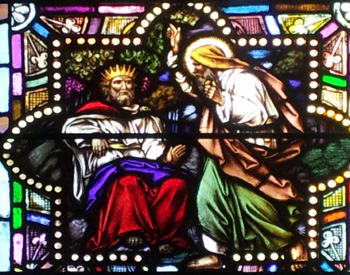 |
| The Elian Cycle Captured in the Windows of the Chapel of Mt. Carmel Monastery Elijah Confronts Ahab (1 Kings 17: 1) |
to Ahab and Jezabel God's displeasure at them
 |
| Thomas Matthews Rooke: Elijah Prophesises to Ahab and Jezabel Their End |
with a threat that there
shall be a terrible drought

until the people of Israel return to the
worship of the true God, Jehovah.
 |
| Cima da Conegliano: God the Father, c1510–27 |
The overture portrays the suffering from the
famine that the drought brings to Israel.
ELIJAH OPUS 70
Overture
Paul Daniel, Conductor
Orchestra of the Age of Enlightenment
the people of Israel
plead for relief
ELIJAH OPUS 70 NO. 1
"Help, Lord!"
Terre Johnson, Conductor
The Southeastern Chamber Orchestra
as well as in the next duet with chorus,
"Lord, bow thine ear."
The prophet, Obadiah,
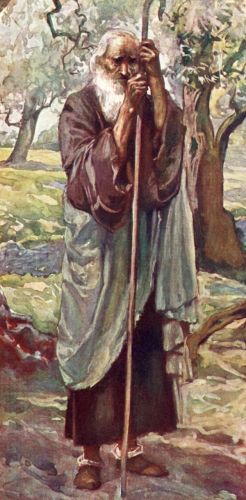 |
| James Tissot: Obadiah the Prophet |
who has remained faithful to God,
reminds the people that the drought is to
punish them for worshipping idols. His aria,
"If with all your hearts,"
advises them to be
true to God. They respond with,
"Yet doth the Lord see it not."



An angel advises Elijah to hide in a small valley
east of the Jordan (where he stays for three years)
to avoid Ahab's wrath, and the angels sing,
"For He shall give His angels."
east of the Jordan (where he stays for three years)
to avoid Ahab's wrath, and the angels sing,
"For He shall give His angels."
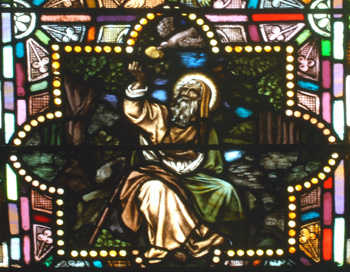 |
| The Elian Cycle Captured in the Windows of the Chapel of Mt. Carmel Monastery Elijah is Fed by Ravens at Cherith (1 Kings 17: 6) |
 |



Later, the angel returns to tell Elijah to
go back to Zarephath by the sea,
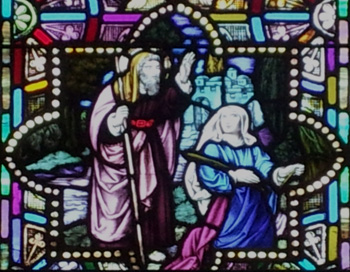 |
| The Elian Cycle Captured in the Windows of the Chapel of Mt. Carmel Monastery Elijah and the Widow (1 Kings 17: 10-16) |
where a widow takes him in. While he stays with
her, her supplies of grain and cooking oil
her, her supplies of grain and cooking oil
miraculously replenish themselves.
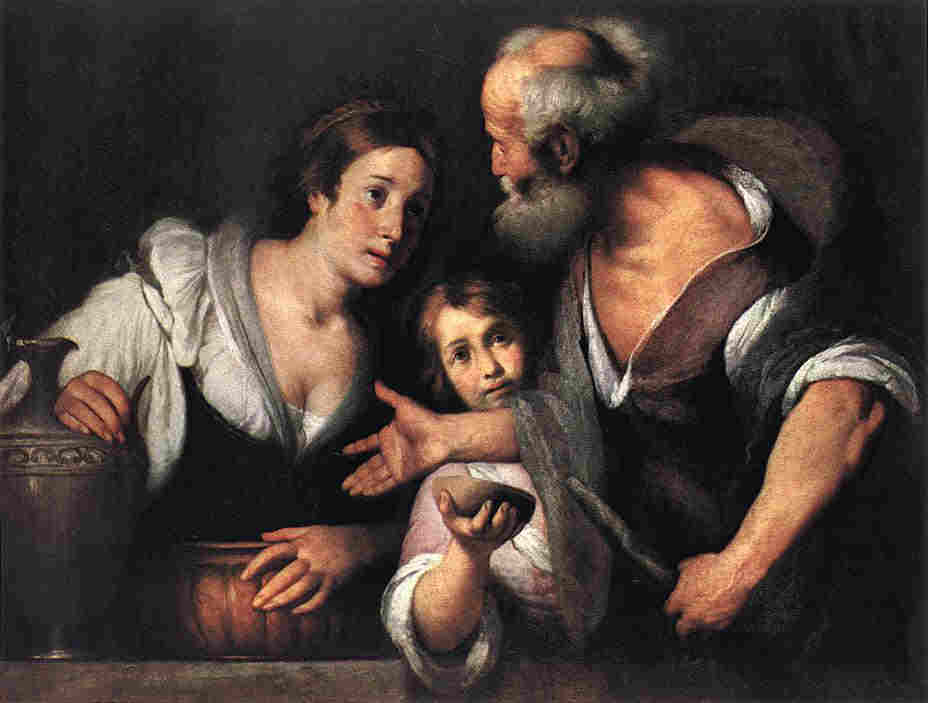 |
| Bernardo Strozzi: Prophet Elijah and the Widow of Sarepta, c1630's |
In the first extended scene of the oratorio
the widow comes to him for help for
her sick child who soon dies. Elijah prays three
times to God, and the boy revives. Observing
this miracle leads to her conversion.
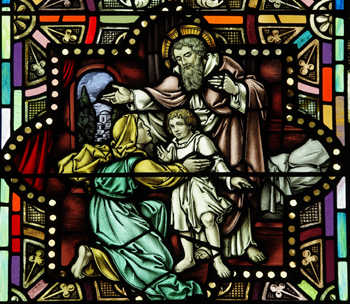 |
| The Elian Cycle Captured in the Windows of the Chapel of Mt. Carmel Monastery Elijah Raises the Widow's Son (1 Kings 17: 17-24) |
They pledge their devotion to God,
and the chorus sings,
"Blessed are the men who fear him."
 |
| Louis Hersent: Elijah reviving the Son of the Widow of Zarephath |



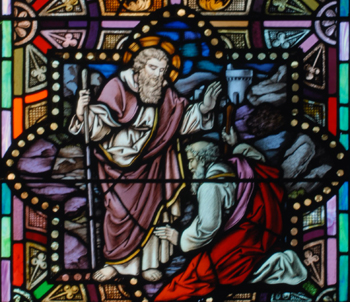 |
| The Elian Cycle Captured in the Windows of the Chapel of Mt. Carmel Monastery Obadiah Petitions Elijah (1 Kings 18: 7-15) |
After three years of drought
Elijah again presents
himself before King Ahab
and proposes a test
to show that God is the true
God and Baal is not.
Elijah again presents
himself before King Ahab
and proposes a test
to show that God is the true
God and Baal is not.
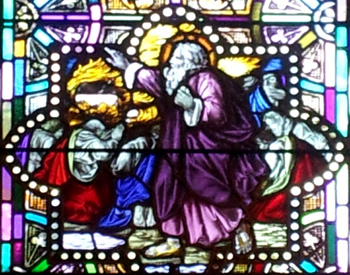 |
| The Elian Cycle Captured in the Windows of the Chapel of Mt. Carmel Monastery Elijah Confounds the Prophets of Baal (1 Kings 18: 21-40) |
 |
| http://jewishexponent.com/prophet-motives |
Elijah,
| Icon of Holy Prophet Elijah Saint Catherine's Monastery, Sinai AD 1200 |
by means of a contest, demands
that the people of Israel call upon
their false Gods for succor. The people
that the people of Israel call upon
their false Gods for succor. The people
of Israel assemble around Mount Carmel
to observe the contest on its summit. Elijah
and the prophets of Baal each place sacrificial
steers on their altars but do not burn them.
Instead, in a series of choruses, Baal's
prophets appeal to Baal to
set their offering on fire in
"Baal, we cry to thee"
and when Elijah taunts them, in
"Hear our cry"
and
"Baal, hear and answer."
The false Gods do not answer; nothing happens.
Elijah then prays to God to send
forth fire from heaven
and the prophets of Baal each place sacrificial
steers on their altars but do not burn them.
Instead, in a series of choruses, Baal's
prophets appeal to Baal to
set their offering on fire in
"Baal, we cry to thee"
and when Elijah taunts them, in
"Hear our cry"
and
"Baal, hear and answer."
The false Gods do not answer; nothing happens.
Elijah then prays to God to send
forth fire from heaven
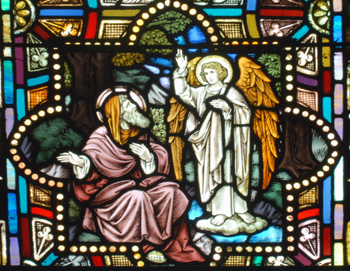 |
| The Elian Cycle Captured in the Windows of the Chapel of Mt. Carmel Monastery The Vision of Elijah in Prayer on Carmel (1 Kings 18: 42-44) |
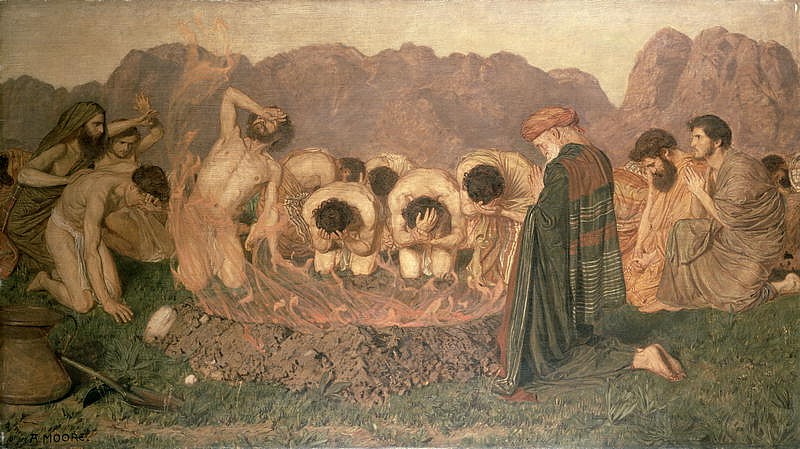 |
| Albert Joseph Moore: Elijah's Sacrifice |
"Lord God of Abraham."
An angel chorus reassures him with
"Cast thy burden upon the Lord."
"Cast thy burden upon the Lord."
And the people of Israel see how
God answers Elijah's prayers in
God answers Elijah's prayers in
_-_Elijah_Begging_for_Fire_from_Heaven_-_Google_Art_Project.jpg) |
| Master of James IV of Scotland (Flemish): Elijah Begging for Fire from Heaven, before 1465- about 1541 |



Elijah orders the people to
kill the prophets of Baal
 |
| https://www.tikkunministries.org/newsletters/mm-apr09.php |
and glories in God's fearsome justice in the aria
"Is not His word like a fire?"
The alto seconds his sentiment in
"Woe, woe unto them!"



In an intricate linked passage with a youth
and the chorus, Elijah importunes God to bring rain
down upon the parched fields
to end the drought.

After each prayer, he sends a youth
to look out to sea for rain clouds.
 |
| http://www.christian-resources-today.com/ biblical-prophets-1c.html |
When the storm arrives,
the people rejoice with
"Thanks be to God."



In the aria,
"Hear ye, Israel,"
"Hear ye, Israel,"
 |
| http://www.2ndchurch.org/building.htm |
the soprano advises the people to obey
God's laws and regain His protection.
ELIJAH OPUS 70
"Hear ye, Israel"
"Be not afraid"
The chorus echoes her with
"Be not afraid."



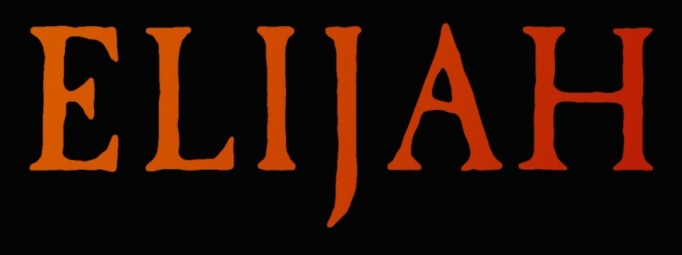
ELIJAH OPUS 70: Part 2
Thomas Hampson, Baritone
Barbara Bonney, Soprano
Robert Shaw, Conductor
Ann Howard Jones, Assistant Conductor for Choruses
Atlanta Symphony Orchestra and Chorus, 1994
Air: Hear ye, Israel! (Barbara Bonney)
Chorus: Be not affraid
Recit (Elijah, Queen) and chorus: The Lord hath exalted thee
Chorus - Woe to him
Recit (Obadiah, Elijah) Man of Godnow let my words be precious
Air (Thomas Hampson): It is enough, O Lord
Recit (Richard Clement) See, now he sleepeth
Trio of Angels (Bonney, Schellenberg,Simpson): Lift thine eyes
Chorus: He, watching over Israel
Recit (Angel, Elijah): Arise, Elijah (Florence Quivar)
Air (Angel): O rest in the Lord (Florence Quivar)
Chorus: He that shall endure to the end
Recit (Elijah, Angel): Night falleth 'round me (Henriette Schellenberg)
Chorus: Behold, God the Lord passed by!
Recit, Quartet & Chorus: Above himstood the seraphim (5,2,3,4)
Chorus: Go, return upon thy way - and recit (Elijah) I go on my way
Arioso (Thomas Hampson): For the mountains shall depart
Chorus: Thus did Elijah the prophet break forth
Air (Jerry Hadley): Then shall the righteous shine forth
Recit: For Godsent his people the prophet Elijah (Barbara Bonney)
Chorus: Thus saith the Lord
Quartet: O come, everyone that thirsteth (3,5,7,8)
Chorus: And then shall your light break forth
Chorus: Be not affraid
Recit (Elijah, Queen) and chorus: The Lord hath exalted thee
Chorus - Woe to him
Recit (Obadiah, Elijah) Man of Godnow let my words be precious
Air (Thomas Hampson): It is enough, O Lord
Recit (Richard Clement) See, now he sleepeth
Trio of Angels (Bonney, Schellenberg,Simpson): Lift thine eyes
Chorus: He, watching over Israel
Recit (Angel, Elijah): Arise, Elijah (Florence Quivar)
Air (Angel): O rest in the Lord (Florence Quivar)
Chorus: He that shall endure to the end
Recit (Elijah, Angel): Night falleth 'round me (Henriette Schellenberg)
Chorus: Behold, God the Lord passed by!
Recit, Quartet & Chorus: Above himstood the seraphim (5,2,3,4)
Chorus: Go, return upon thy way - and recit (Elijah) I go on my way
Arioso (Thomas Hampson): For the mountains shall depart
Chorus: Thus did Elijah the prophet break forth
Air (Jerry Hadley): Then shall the righteous shine forth
Recit: For Godsent his people the prophet Elijah (Barbara Bonney)
Chorus: Thus saith the Lord
Quartet: O come, everyone that thirsteth (3,5,7,8)
Chorus: And then shall your light break forth



The second act begins with the people of
Israel hailing Elijah and the true God.
 |
| A depiction on the wall of a third-century C.E. synagogue at Dura-Europos in modern Syria. Shown here, Elijah and his followers have easily conjured up a blazing fire, which engulfs their white bull. Seeing the flames, the Israelites call out, "Yahweh alone is God, Yahweh alone is God." |




Ahab and Jezebel persist
in worshipping Baal, and
Elijah condemns them prophesying
that God will again punish Israel.
Queen Jezebel,
in worshipping Baal, and
Elijah condemns them prophesying
that God will again punish Israel.
Queen Jezebel,
 |
| Henry John Stock: Jezebel, 1882 She is pictured here as a Victorian woman wearing a red dress, surrounded by evil influences. |
in revenge, incites the people
against him whipping the people into a
frenzy until, in
"Woe to him,"
they vow to kill Elijah.
Obadiah warns the prophet to flee
to the desert for his life.
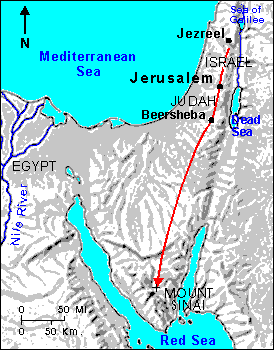 |
| Elijah Flees Jezebel |
then into the wilderness.
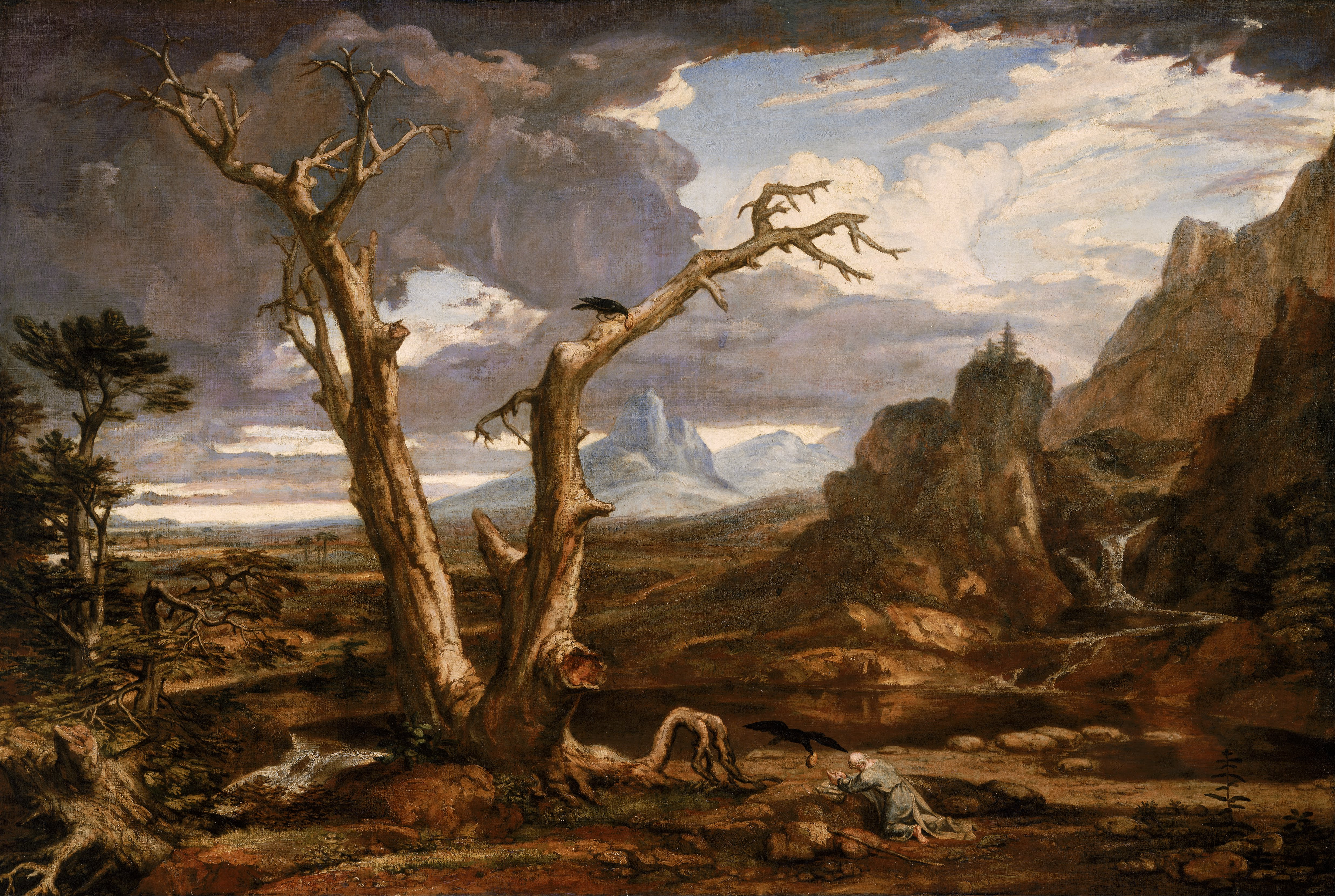 |
| Washington Allston: Elijah in the Wilderness |



Utterly depressed over his failure,
a desperate Elijah asks God
to let him die in the aria,
"It is enough."
As he sleeps, the angels sing,
"Lift thine eyes"
and
"He, watching over Israel."
An angel appears to send Elijah far south to
Mount Horeb, also known as Mount Sinai.
When he still despairs that his prophesies
to the people of Israel have been in vain,
the angel comforts him with the aria,
"O rest in the Lord,"
ELIJAH OPUS 70
"O rest in the Lord"
Kathleen Ferrier, Contralto
ELIJAH OPUS 70
"O rest in the Lord"
Kathleen Ferrier, Contralto
and an angel chorus sings,
"He that shall endure."
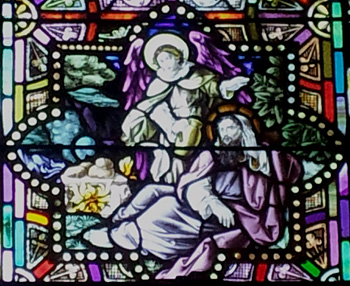 |
| The Elian Cycle Captured in the Windows of the Chapel of Mt. Carmel Monastery God Strengthens Elijah with Food and Drink (1 Kings 19: 4-8) |
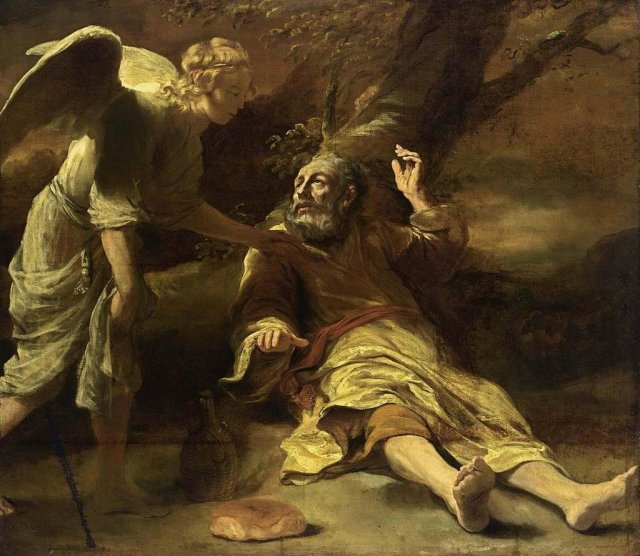 |
| "Lord," he said, "I have had enough, take my life; I am no better than my ancestors." Then he lay down and went to sleep. But an angel touched him and said, "Get up and eat." |
to watch over him, telling him that God
"slumbers not, nor sleeps"
and another angel bids him to have
faith that the true God will win out.
and another angel bids him to have
faith that the true God will win out.



Continuing on with his journey he
walked 40 days and 40 nights
finally to reach Mount Sinai
and asks God to appear to him.
An angel tells him to veil his face
to withstand the presence of God.
walked 40 days and 40 nights
finally to reach Mount Sinai
and asks God to appear to him.
An angel tells him to veil his face
to withstand the presence of God.
The chorus sings,
"Behold, God the Lord passed by."
The heavenly host appears

and an octet and chorus of angels sing
praises back and forth in
"Holy, holy, holy."
 |
| Sunrise at Mount Sinai in Egypt |



Afterward, in
"Go, return upon thy way,"
the angels tell Elijah to return to Israel as
a prophet to the people there.
Elijah sings of God's eternal mercy in
"For the mountains shall depart."
Then, the chorus mentions fiery triumphs
over King Ahaziah,
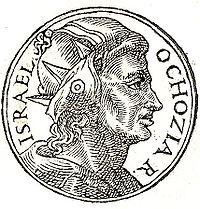 |
| King Ahaziah |
Ahab's successor, and describes
Elijah's ascent to heaven in a fiery
chariot to gain his final reward in
"Then did Elijah the prophet break forth."
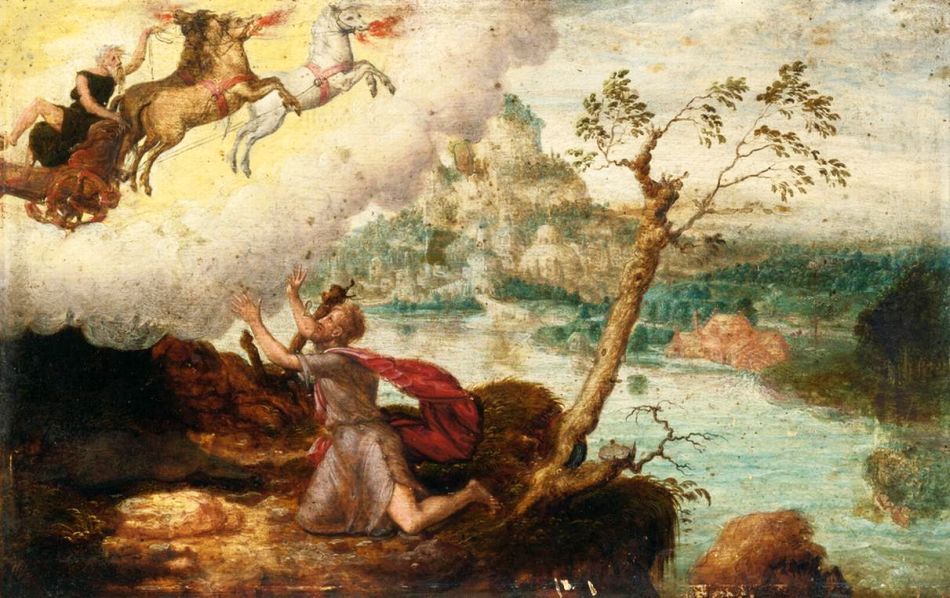 |
| Herri met de Bles: Elijah Ascending to Heaven in the Fiery Chariot |
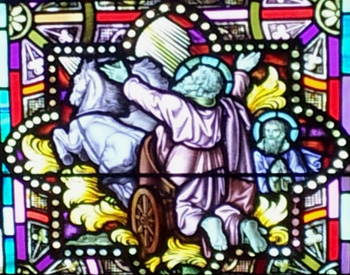 |
| The Elian Cycle Captured in the Windows of the Chapel of Mt. Carmel Monastery Elijah Ascends in a Fiery Chariot (2 Kings 2: 9-12) |
 |
| Peter Paul Rubens: Elijah |
The tenor aria,
"Then shall the righteous shine forth,"
tells of his arrival in heaven.
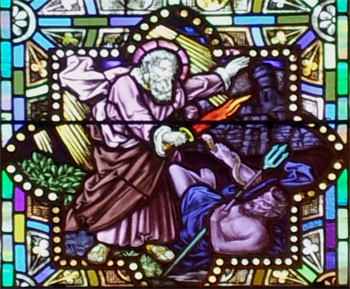 |
| The Elian Cycle Captured in the Windows of the Chapel of Mt. Carmel Monastery Elijah Conquers the Antichrist (Sirach 48: 1-12) |
The finale links Elijah with
the Messiah's coming.
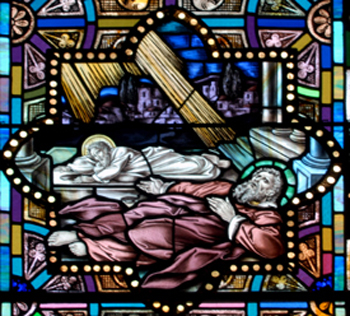 |
| The Elian Cycle Captured in the Windows of the Chapel of Mt. Carmel Monastery Elijah as Martyr (Matthew 17: 9-13) |
The chorus sings
"But the Lord from the north,"
the four soloists sing
"O come everyone that thirsteth,"
and the chorus ends with both
"And then shall your light"
and a fugue,
"Lord, our Creator."
 |
| A fresco of Saint Ilia (Elijah) from the ceiling of Rila Monastery, Bulgaria |

LINKS
http://www.takte-online.de/en/orchestra/detail/browse/10/artikel/oratorium
-die-neuausgabe-von-mendelssohns-elias/index.htm?tx_ttnews%5Bback
Pid%5D=519&cHash=07237a5feed81d454f2e314965f39864
http://www.carmelites.ie/CarmelMusic1.pdf
-die-neuausgabe-von-mendelssohns-elias/index.htm?tx_ttnews%5Bback
Pid%5D=519&cHash=07237a5feed81d454f2e314965f39864
http://www.carmelites.ie/CarmelMusic1.pdf



MARC CHAGALL'S ART and ELIJAH
| Marc Chagall:Mosaic of the Prophet Elijah, 1970 |
 |
| Marc Chagall: Elijah Touched by Angel |
 |
| Marc Chagall: The Widow and Elijah |
 |
| Marc Chagall: Elijah on Mount Carmel |
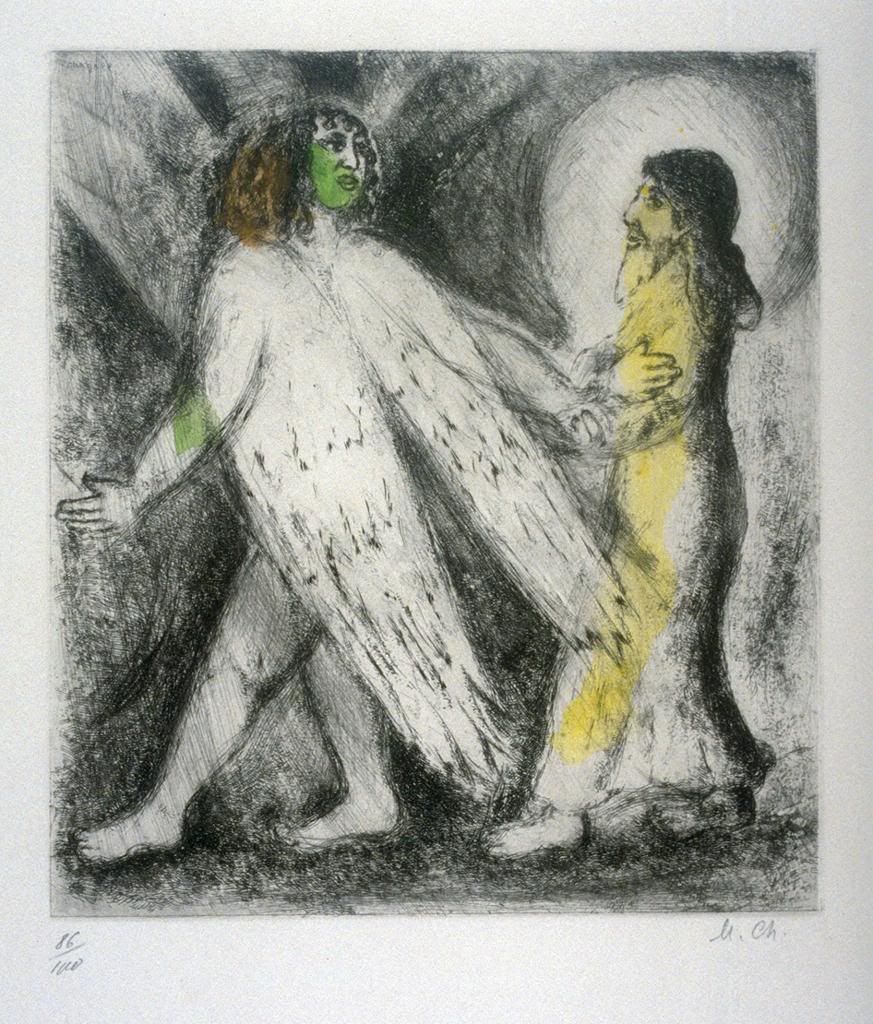 |
| Marc Chagall: Angel Leading Elijah |
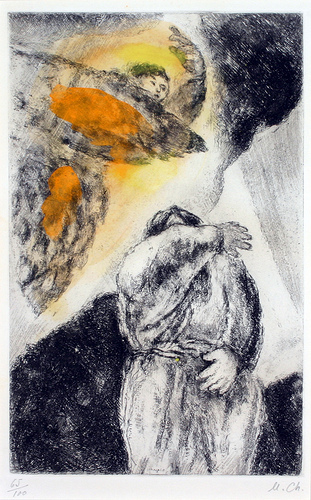 |
| Marc Chagall: Elijah's Vision, 1957 |
 |
| Marc Chagall: Elijah Ascends to Heaven |





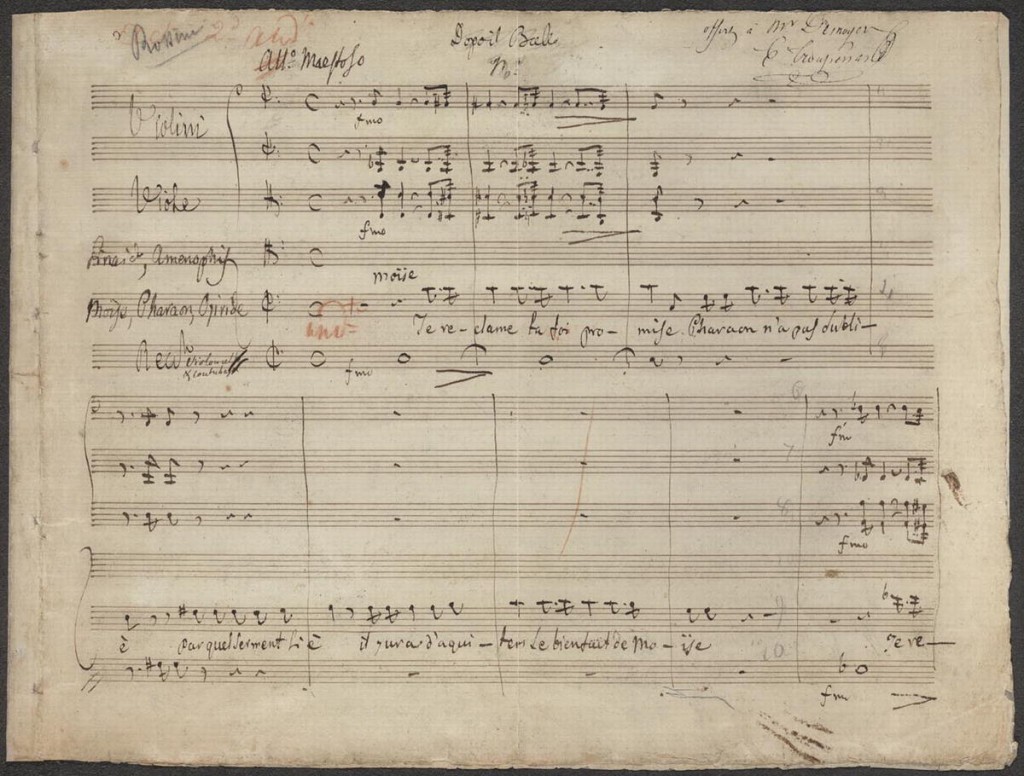


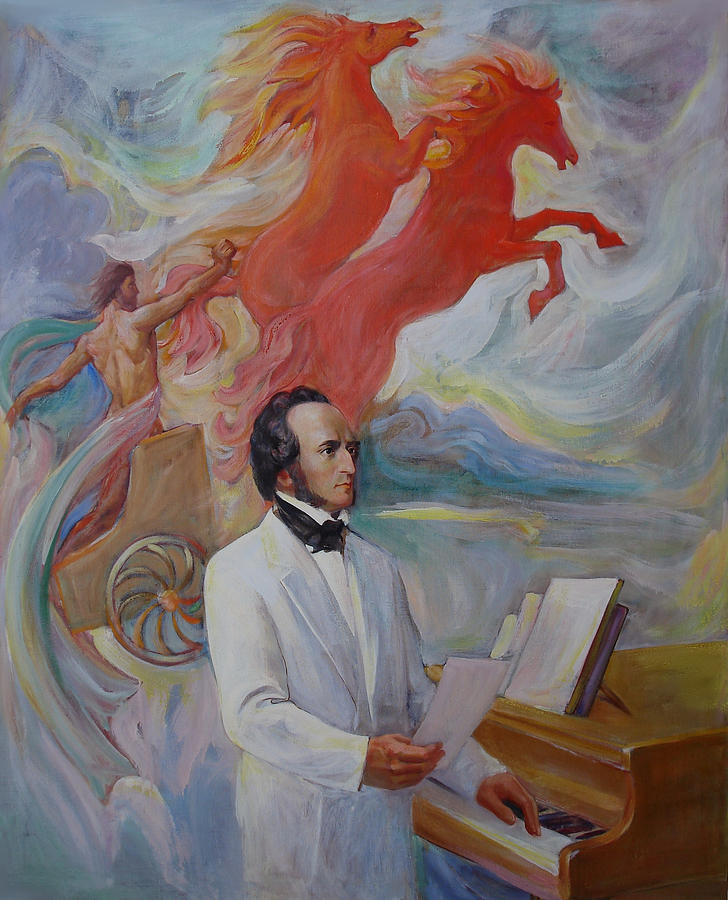




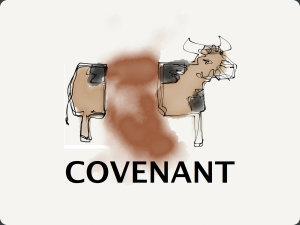



.jpg)




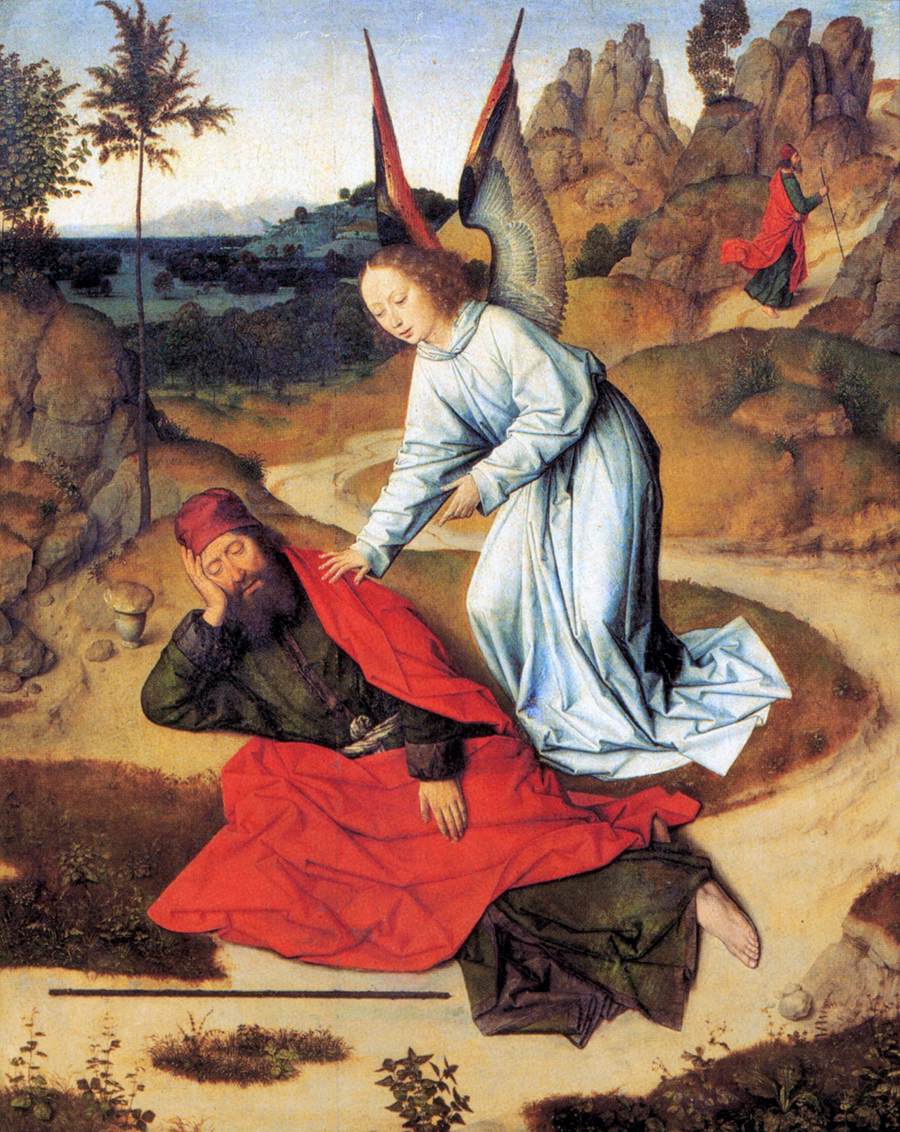
.jpg)
.jpg)
